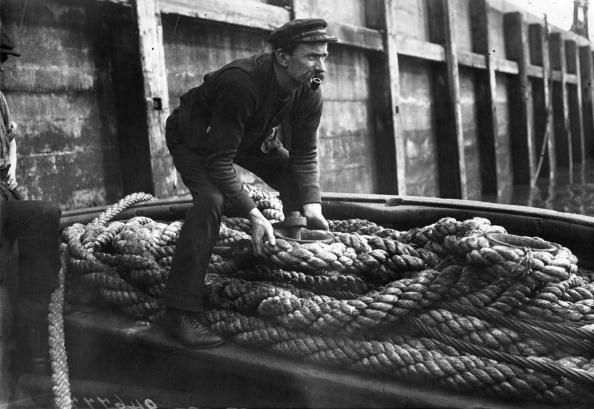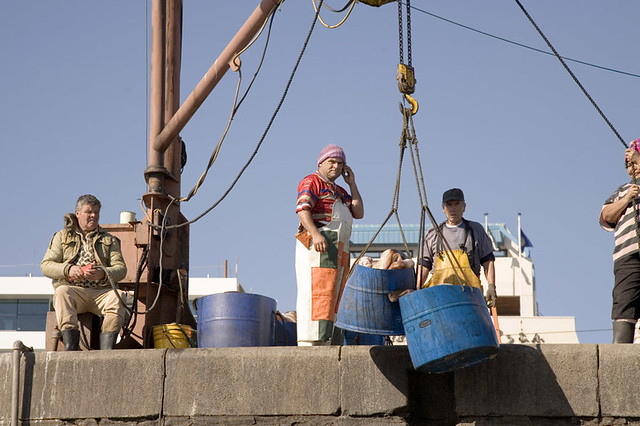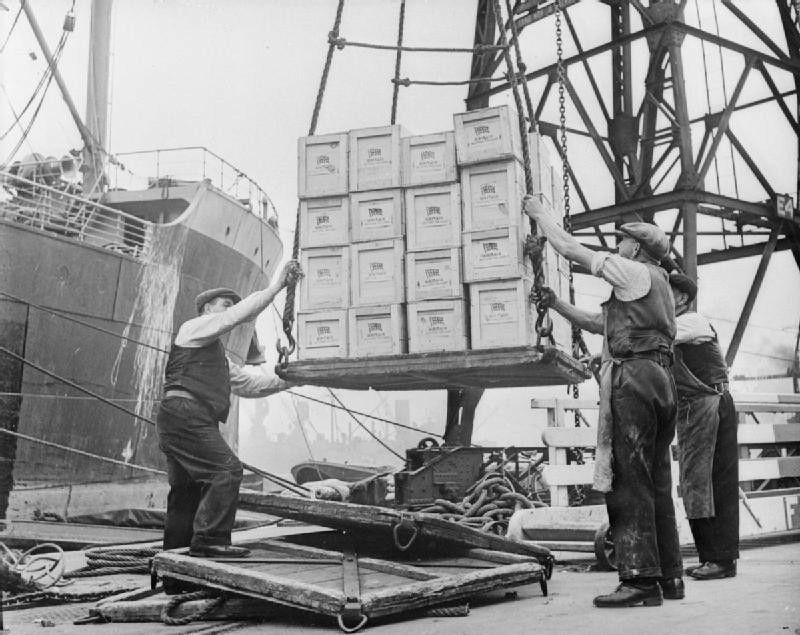Are you curious about what a dock worker actually does? Maybe you’re wondering if this career path could lead to a six-figure salary. Or perhaps you’re interested in knowing which companies pay their dock workers the most. Regardless of your questions, we’ve got you covered. In this blog post, we’ll explore the duties and responsibilities of a dock worker, as well as the average salary and qualifications required for the job. We’ll even tackle some common misconceptions, such as whether women can work as longshoremen. So, let’s dive in and discover what life is really like for those who work on the docks.

Understanding the Role of Dock Workers.
A dock worker is a skilled professional who performs a wide range of tasks related to the loading and unloading of cargo onto ships. These individuals are responsible for ensuring that goods are loaded and unloaded safely and efficiently, and are secured to the moorings in order to prevent any damage or accidents. Dock workers are also responsible for inspecting cargo, maintaining equipment, and communicating with other workers to ensure that the entire process runs smoothly.
In addition to loading and unloading cargo, dock workers are also responsible for maintaining the cleanliness and orderliness of the shipping dock. They are expected to keep the area clear of debris and to ensure that all equipment is in good working condition. Dock workers must also be knowledgeable about safety regulations and procedures in order to prevent accidents and injuries on the job.
Overall, being a dock worker is a physically demanding job that requires a great deal of skill and attention to detail. These professionals must be able to work in all weather conditions and be prepared to handle heavy loads and operate heavy machinery. Despite the challenges, many people find this career rewarding and fulfilling, as it provides a sense of pride in contributing to the global economy through the efficient movement of goods.
>> Must read Do crew members hook up on cruise ships?
Earning Potential of Dock Workers: Can They Make Six-Figure Salaries?
Dock workers, particularly union longshoremen on the West Coast, can earn a significant amount of money. According to data from the shipping industry, around 50% of union longshoremen make over $100,000 annually, with some earning much more. Foremen and managers fare even better, with more than half of them earning over $200,000 every year. It’s not uncommon for a few bosses to make over $300,000. One of the perks of being a dock worker is that they receive free healthcare, which can be a significant benefit for those with families or health issues. While this level of earning potential is not guaranteed and depends on factors like experience and location, it is clear that being a dock worker can lead to a comfortable lifestyle.
Trending now – Do guests pay to go on Below Deck?
Exploring the Salary Range of Dock Workers: What Can You Expect to Earn?
Dock workers are essential for the smooth operation of ports and shipping yards. They are responsible for loading and unloading cargo, operating machinery, and maintaining the dock area. One of the most important factors that job seekers consider before pursuing a career as a dock worker is the salary. So, what is the average salary for a dock hand?
According to our proprietary Total Pay Estimate model, the estimated total pay for a Dock Hand is $41,902 per year in the United States area, with an average salary of $39,558 per year. These numbers represent the median, which is the midpoint of the ranges based on salaries collected from our users. It is important to note that the salary of a dock worker may vary depending on the location, company, and experience.
Dock workers are typically paid an hourly wage, which can range from $12 to $25 per hour. However, some companies offer their dock workers additional benefits such as health insurance, retirement plans, and paid time off. It is also worth noting that experienced dock workers who specialize in specific tasks, such as crane operators or forklift drivers, may earn a higher salary.
Overall, the salary of a dock worker may not be as high as some other professions, but it is a stable and reliable career path with opportunities for growth and advancement. Additionally, the work of a dock worker is crucial to the global economy, making it a rewarding profession for those who enjoy hands-on work and contributing to a larger cause.

Top-paying Companies for Dock Workers: Which Companies Offer the Highest Wages?
Dock workers are an integral part of the global trade industry, responsible for loading and unloading cargo from ships at ports. If you’re interested in pursuing a career as a dock worker, you must be wondering which company pays the most. Based on the reviews and salary reports, here are some of the top-paying companies for dock workers in the United States.
Thompson Construction Group, Inc. is a leading construction company that offers dock workers an hourly wage of $29.93. With 349 reviews, the company has a rating of 3.6 out of 5. This company provides excellent benefits and opportunities for growth, making it a popular choice among dock workers.
Another top-paying company is Old Dominion, which offers an hourly wage of $26.16 for dock workers. With a rating of 3.7 out of 5, this company provides excellent benefits and a positive work environment. Old Dominion Freight Line, another subsidiary of Old Dominion, also pays its dock workers an hourly wage of $26.10.
Averitt, with a rating of 3.7 out of 5, pays its dock workers an hourly wage of $25.25. This company provides excellent benefits, including healthcare, retirement savings, and paid time off, making it an attractive option for those looking for job security.
Central Freight Lines, with a rating of 2.8 out of 5, pays its dock workers an hourly wage of $24.48. Despite the lower rating, this company provides competitive wages and benefits, making it a viable option for those looking for a job in the industry.
In summary, if you’re looking to become a dock worker and want to know which company pays the most, these companies are the top-paying options in the United States. It’s important to note that wages can vary depending on experience, location, and other factors.
Breaking Stereotypes: Women in Longshoreman Work.

Longshore work is traditionally associated with being a male-dominated industry, but times are changing. Maria Adame, a longshoreman working for the Port of Long Beach and Port of Los Angeles in California, is one of a few women who have broken into this field. As a longshoreman, Maria’s primary responsibility is to load and unload cargo ships that arrive at the port carrying a wide range of goods, from electronics to airplane parts, clothes, and household items.
While it may not be the most glamorous job, being a longshoreman can be a lucrative and rewarding career for those who are up for the challenge. Despite the physical demands of the job, which can include working in all types of weather conditions and lifting heavy objects, many people find the work to be satisfying.
As the industry continues to evolve, there is no doubt that more women will be entering the field of longshore work. For those who are interested in pursuing a career in this field, it is essential to have a strong work ethic and a willingness to learn. With the right attitude and a commitment to hard work, anyone can succeed as a longshoreman, regardless of their gender.
A Day in the Life of a Dock Worker: A Glimpse into the World of Maritime Labor.
As a dock worker, the job responsibilities can be physically demanding and require you to work in various weather conditions. You will be responsible for unloading and loading cargo, which may include heavy lifting and operating machinery. An essential task for a dock worker is unmooring ships before their departure, which involves untying ropes and cables that keep the vessel in place. Moreover, it is crucial to maintain an accurate record of misplaced or damaged cargo to ensure that the right items reach their destination.
Dock workers must follow the loading plans and participate in all training programs, which are necessary to ensure the safety of everyone involved. Another important aspect of being a dock worker is the ability to secure the cargo before departure using rigging and lashings. This involves tying the cargo to the ship’s deck to ensure that it remains in place during transit.
The job can be physically demanding and requires a lot of manual labor. It can also be dangerous if the worker is not careful or if equipment is not used correctly. Dock workers must be prepared to work in various weather conditions, including rain, snow, and high winds. In addition to the physical demands, dock workers must have good communication skills, as they work in a team environment and must be able to follow instructions carefully.
Overall, being a dock worker requires a lot of hard work, attention to detail, and a willingness to work in various conditions. However, it can be a rewarding job for those who enjoy working with their hands and being part of a team that plays a critical role in global trade.
Exploring the Responsibilities of a Dock Worker.
Port workers have a range of duties that are vital to the efficient and safe operation of a port. One of the primary responsibilities of a port worker is to load and offload cargo from ships, trucks, and other transportation vehicles. This involves following standard operating procedures to ensure that the cargo is being handled safely and efficiently. In addition to loading and offloading, port workers also have to stack cargo in the appropriate areas and secure it with hooks and tarps to prevent any damage during transportation. They also have to place and remove dunnage, which is the material used to support and protect cargo during transport.
Apart from handling cargo, port workers are also responsible for maintaining a clean and safe working environment. This includes cleaning operational areas, rail trucks, plants, workshops, offices, sheds, and ablution facilities as instructed. Regular cleaning ensures that the port is free from any hazards or debris that could cause accidents or delays.
Overall, the duties of a port worker require physical strength, attention to detail, and the ability to follow standard operating procedures. It is a challenging job that involves working in all weather conditions and requires a high level of safety awareness. However, for those who are up to the challenge, a career in port work can be rewarding both financially and professionally.
The Nomenclature of Dock Ownership
A dockmaster is a vital figure in the operation of a dock. As the person in charge of overseeing the freight, logistics, and maintenance of ships, they play a crucial role in ensuring that everything runs smoothly. The term “dockmaster” is used specifically to refer to the person in charge of a dockyard or drydock, where ships are repaired and maintained.
It’s important to note that the role of a dockmaster is distinct from that of a harbormaster. While both positions are responsible for overseeing port operations, a harbormaster typically holds a higher rank and has a broader range of responsibilities.
The job of a dockmaster requires a combination of technical knowledge and managerial skills. They must have a good understanding of the equipment and machinery used in ship repair and maintenance, as well as the ability to manage a team of workers effectively.
Overall, the dockmaster plays a vital role in the smooth functioning of a dockyard. They are responsible for ensuring that ships are repaired and maintained efficiently, and that freight and logistics operations run smoothly. If you’re interested in pursuing a career in this field, it’s important to have a strong background in engineering or logistics, as well as good managerial skills.
Understanding the Job Titles of Workers in Ocean Ports.
Stevedores, also known as dockworkers or longshoremen, are the ocean port workers who are responsible for loading and unloading ships with heavy cargo. These workers have been an integral part of the maritime industry throughout history. The job of a stevedore is highly perilous, and they need to possess specialized knowledge and skills to handle the cargo properly and ensure that the loading and unloading processes are carried out safely.
The term “stevedore” is derived from the Spanish word “estibador,” which means “a person who loads.” Stevedores work in a variety of environments, including wharves, piers, container terminals, and warehouses. They operate heavy machinery such as cranes, forklifts, and straddle carriers to move cargo from ships to the dock and vice versa.
Being a stevedore is a physically demanding job that requires strength, endurance, and agility. These workers must be able to work in all weather conditions and be prepared to work long hours, including weekends and holidays. They also need to have excellent teamwork and communication skills to coordinate with other workers and ensure that the loading and unloading processes are done efficiently.
In summary, stevedores are the ocean port workers who are responsible for loading and unloading ships with heavy cargo. They play an essential role in the maritime industry and have been doing this job for centuries. These workers need to have specific skills and knowledge to handle the cargo safely and efficiently, and their work requires physical strength, endurance, and teamwork.
Exploring the Requirements for Working at a Port
To work on a port, you need to have the right qualifications to excel in the field. One of the essential educational requirements is a postgraduate diploma or MBA in shipping and port management. These courses equip individuals with the necessary skills and knowledge to manage the day-to-day operations of the port.
The shipping and port management program provides a comprehensive understanding of the shipping industry, including the regulatory requirements and international shipping practices. The course also covers port management, including the business aspects of port operations, cargo handling, and logistics.
Having a postgraduate diploma or MBA in shipping and port management makes you an ideal candidate for a management position in the port industry. It also opens up opportunities for career advancement, as you can work in different areas such as operations, finance, and marketing.
In addition to the educational qualifications, you need to have some personal attributes to succeed in this field. These include excellent communication and problem-solving skills, attention to detail, and the ability to work under pressure.
Overall, pursuing a postgraduate diploma or MBA in shipping and port management is an excellent way to gain the necessary qualifications to work on a port. It is a highly rewarding career that offers tremendous growth opportunities for individuals who are committed to excellence.
Being a dock worker requires a lot of physical labor and specific skills to ensure that cargo is loaded and unloaded safely and efficiently. While the average salary for a dock hand may not reach six figures, certain companies pay their workers more than others. It’s also worth noting that women can be longshoremen and that the qualifications for working on a port vary depending on the specific job. Overall, being a dock worker can be a rewarding career path for those interested in the shipping industry.



